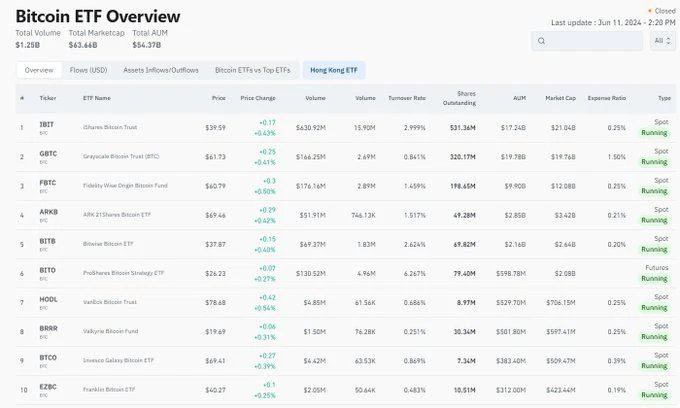原作者: 0xTodd (X: @0x_Todd)
Editors note: On June 27, VanEck submitted an application for Solana Trust, a spot exchange-traded fund. This new fund is the first Solana ETF to be applied for in the United States. Is the SOL ETF expected to become another cryptocurrency approved after BTC and ETH? Crypto KOL @0x_Todd published an article analyzing the resistance faced by the SOL ETF application, which Odaily Planet Daily summarized as follows:
Why is it so hard to wait for SOL ETF? Because it may not make money. Last week, Cathie Wood鈥檚 Ark Fund decided to withdraw the ETH ETF application.
Ark BTC ETF ranks 4th (market share 6%, the top 3 are BlackRock, Grayscale and Fidelity), but according to market speculation, it is not very profitable. The main reason is that the fee rate of BTC ETF is relatively low compared with traditional ETFs, many of which are in the range of 0.19-0.25%, and ETFs are also engaged in fee rate competition.
A simple estimate shows that with the current size of Ark BTC ETF, it can earn about $7 million in management fees a year, so the corresponding costs should be of the same order of magnitude. Therefore, if Ark BTC ETF is still hovering near the profit line, then for Ark, pushing ETH ETF may become a loss-making business. Therefore, even Ark can only reluctantly give up ETH ETF.
From a purely business perspective, mainstream coins with lower market capitalization, such as $SOL , have a market capitalization of 5% of $BTC . In order to recover the annual cost of US$7 million, an ETF must manage at least 20 million SOL.
BlackRock, the current leader in crypto ETFs, only manages 1.5% of the entire BTC network, while 20 million SOL means 4.5% of the $SOL paper circulation.
In addition, consider:
(1) SOL is naturally more difficult to raise than BTC, which has no interest. SOL can earn about 8% on the chain, but ETFs are prohibited from including staking functions. Holding SOL ETF means that it will naturally underperform SOL on the chain by 8%, while Bitcoin only underperforms by 0.2% management fees.
Taking Grayscale as an example, the peak of GBTC was 600,000, while the peak of SOL was only 450,000, which is much lower than BTC.
(2) The paper circulation of SOL is 460 million, but the actual circulation may be much lower than this. Everyone knows this.
The lower circulating market value requires a larger holding while bearing high interest rates and regulatory pressure. Therefore, if SOLs current market value and circulation are taken into account, it will be difficult for these institutions to make money.
From a business perspective, who would have the motivation to promote a business that doesn鈥檛 make money?
This article is sourced from the internet: Opinion: Is it a losing trade? What obstacles does the SOL ETF face?
Related: BTC continues to fluctuate in a narrow range, miner reserves fall to a three-year low
Original author: Mary Liu, BitpushNews The crypto market was mixed on Thursday, with Bitcoin continuing to fluctuate in a narrow range. According to BitPush data, BTC hit an intraday high of $66,455.50, but the bulls lost momentum again and fell to a daily low of $64,656.72 after midday. As of press time, it returned to above $65,000, with a 24-hour volatility of almost zero. Altcoins also tended to flatten. In the past 24 hours, among the top 200 tokens by market value, Worldcoin (WLD) led the gains, up 11.82%, followed by Fetch.AI (FET) up 11.29%, and SingularityNET (AGIX), up 9.46%. zkSync (ZK) led the decline, down 9.81%, Flare (FLR) down 6.41%, and JasmyCoin (JASMY) down 5.57%. The current overall market value of cryptocurrencies is $2.36 trillion, and Bitcoins market share…












